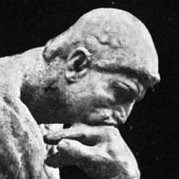
"The ship wherein Theseus and the youth of Athens returned [from Crete] had thirty oars, and was preserved by the Athenians down even to the time of Demetrius Phalereus, for they took away the old planks as they decayed, putting in new and stronger timber in their place, insomuch that this ship became a standing example among the philosophers, for the logical question of things that grow; one side holding that the ship remained the same, and the other contending that it was not the same."
That was Plutarch, for the record, although the legend predates even him, the exact date is unknown. But does that change things for you? If each part is replaced as a so much smaller part of the whole, is it then the same ship? The same axe?
Think on that for a minute, before I take an even rougher tack.
So, now that you've come to your conclusion about the ship, let's go one step further. If all the parts of a human being are replaced one by one, how small do the parts need to be, before you'll accept that it's the same human being? Limb by limb? Organ by Organ? Centimetres? Millimetres?
How about cell by cell? Science tells us that on average, every cell in the human body (Including the brain) is replaced every seven years. It's not exact, mind, and some things might hang about longer than others, but still. Is that the same human being in seven years?
Literally, in the sense of physical matter, it's not the same. It's a different human, because that person has changed anyway, not just in what parts make up the whole. But to everyone, surely, they're still the same person. The emotional attachment, if any, that you feel to a person, remains the same. They are the same person you knew from seven years ago.
Perhaps it's less the matter that makes an object, and rather the reference we take to it? Is it the same axe? It's still your grandfather's axe, or George Washington's axe. It's still Theseus' ship.
At least that's how I look at it!
If you disagree, let me know. I'd love to hear it!
Cheerio,
The Thinker




DNA?
ReplyDeleteThe soul?
My Scientific American describes all of the advances in prosthetics and electronic-mechanical devices being worked on. At what point does me stop being me?
My wife has been trying to change me for fifty years. If she had achieved that, would I still be me?